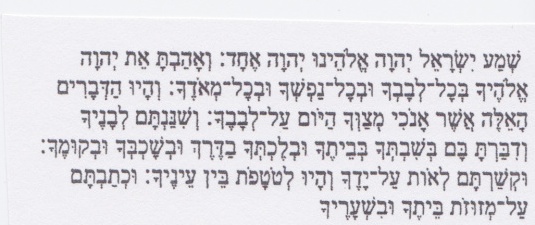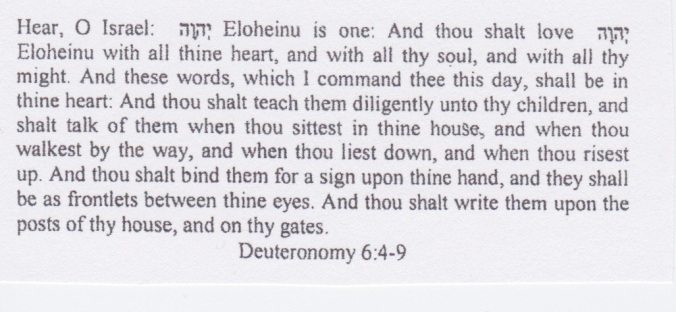If you come to visit us, you’ll notice something on the doorpost at the entrance to our home that wasn’t there before our trip to Israel.

Four inches long and made of brass, it is a mezuzah container. Hidden inside are two tiny slips of paper, one in Hebrew and the other in English.


Mezuzahs are fastened to the door frames of Jewish homes to fulfill the Biblical commandment to write the words of the Shema, the command that is central to the Jewish faith, on the door frames of their houses. (Deuteronomy 6:5-9)
“Love the Lord your God with all your heart and with all your soul and with all your strength.”
If ours were a true Jewish mezuzah, there would be just one scroll inside. It would have been handwritten by a certified scribe with specially prepared ink on kosher parchment made of thinly shaved hide. If we were a Jewish family, we would have several mezuzahs, not just the one on the outside doorpost. Every doorway that leads into a proper room, except for the bathroom, would have its own mezuzah. Each of our hotel rooms in Israel had one.
A mezuzah is permanently affixed to the right doorpost, on the lower part of the upper third. It is traditionally hung on a slant, as shown in the photo above, with the top pointing inward. A special blessing is usually read or recited prior to affixing each mezuzah.
Mezuzah cases come in a variety of sizes and materials. Ours is a Messianic mezuzah made specifically for a Christian home. The symbol at the top is the Hebrew letter “Shin”, the first letter of Shaddai (Almighty), one of the Biblical names of God. Below it is the Messianic Seal of the Church of Jerusalem which incorporates a menorah (seven branched candelabra), a distinctly Jewish symbol, and a fish, which has been used as a symbol of Christianity since its very early days. The triangular base of the candelabra and the tail of the fish tie the two symbols together and form the Star of David, the national symbol of Israel.
The mezuzah at the entrance to our home will long be a reminder of our amazing pilgrimage to Israel, but also an expression of our faith in God.
“As for me and my household, we will serve the Lord.” Joshua 24:15
what a fantastic write-up of your trip! Thank you so much!!
You’re welcome, Joyce! I’ve loved writing it.
You are free to do as you like, but I do hope you are aware that affixing a mezuzah on your door when you are not Jewish is HIGHLY frowned upon by the Jewish community. With this one,. you are signaling the public that a Jew lives in your home and that they use symbols that are contrary to the Jewish religion. If you respect the Jewish people, I would urge you to consider putting the mezuzah indoors. You can see it, remember your trip, symbolize your faithfulness to your God, while also respecting the Jewish community.
We considered this when we discussed where to place our mezuzah, but since we live in a tiny rural community with no Jewish population, we felt that placing it outdoors wouldn’t offend anyone. We also chose one that is clearly identifiable as Christian.
The fact that it combines a Jewish object with a Christian symbol is a part of the problem.
How does the Jewish community at large respond to the logo of Humanistic Judaism that combines the menorah with a human figure?
I’ve never seen a complaint, though I’m sure if you look, there would be something somewhere. Being human is a part of Judaism. Jesus is not. A mezuzah identifies a Jewish home. A similar comparison would be if I were to take a cross, affix a little Buddha, and hang it on my front porch.
I stumbled upon your page when looking for a messianic mezuzah. After reading the comment thread I just wanted to let you know that I think that the Tree Hugging Humanist is way off base here. Jewish teaching on the reason for the mezuzah states the following:
“Whenever one enters or leaves a home with the mezuzah on the doorpost, he will be confronted with the declaration of God’s unity, blessed by His holy name; and will remember the love due to God, and will be aroused from his slumbers and his foolish absorption in temporal vanities. He will realize that nothing endures to all eternity save knowledge of the Ruler of the universe. This thought will immediately restore him to his right senses and he will walk in the paths of righteousness.” Maimonides
As per this great Jewish teaching, the mezuzah is a wonderfully effective way to remind us that there is one God and we should love him with all that we have. As a Christian, how is this not relevant? And as a Jew, how is this offensive? The God of Abraham in the Torah makes it clear that he is the ONLY God. I know of no Jews who claims exclusive rights to the only God.
Her claim that Jesus is not a part of Judaism is irrelevant. The fact is, Christianity, is by definition, tied to Judaism. The “Christ” in “Christianity” is the word used for “Messiah”. But whose messiah is he claiming to be?, the Messiah spoken of in the Torah and the Prophets! The JEWISH MESSIAH!
Finally, claiming this connection of a Christian symbol and a Jewish symbol is analogous to a cross with a Buddha only shows an ignorance of the foundations of Christianity.
In the end, either Jesus is the Jewish Messiah or he isn’t. If he is, then all of the Jewish laws have been fulfilled in him and his death on the cross has atoned for the sins of all believers. If he is not, then the Jewish people have to come to terms with the fact that a God who was in constant communication with his people has been silent for 2400 years now and the Temple that was built to carry out the sacrifices has been destroyed leaving them with no way to atone for their sins and therefore no way to be reconciled to God.
My prayer is that when the Tree Hugging Humanist really looks at how history has unfolded, it will be clear that God has not forsaken her, and that the way to reconcile with himself is available to her through Jesus Christ, the Jewish Messiah.
Now what MAY be found offensive by Jews is the fact that the image of the Hebrew text on your web page is upside-down. This is one of the most important passages in the Torah and should be displayed honorably.
God bless.
Thank you so much for your very thoughtful comment and thank you for pointing out my error! I had no idea. There was absolutely no disrespect intended and I have corrected accordingly.
I hope you’ve been successful in your quest to find a messianic mezuzah.